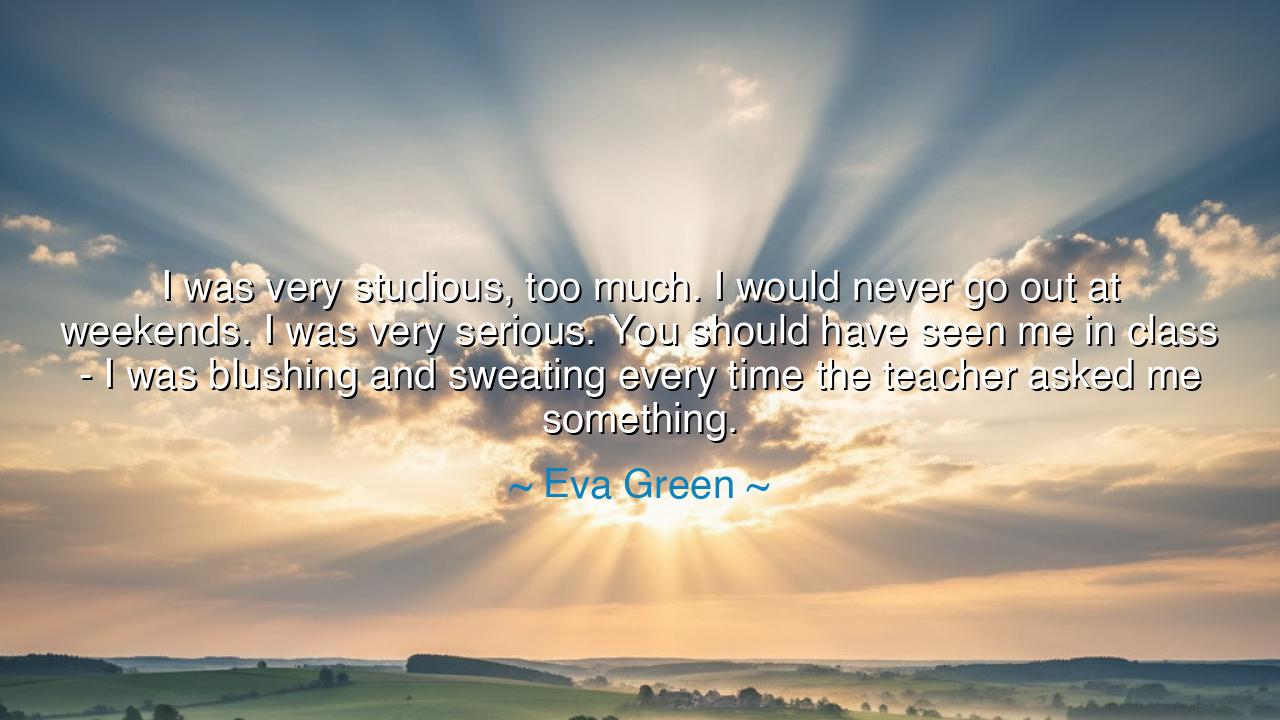
I was very studious, too much. I would never go out at weekends.
I was very studious, too much. I would never go out at weekends. I was very serious. You should have seen me in class - I was blushing and sweating every time the teacher asked me something.






Hear, O seekers of wisdom, the words of Eva Green: “I was very studious, too much. I would never go out at weekends. I was very serious. You should have seen me in class – I was blushing and sweating every time the teacher asked me something.” In these words lies the tale of a soul weighed down by earnestness, struggling beneath the gaze of others, yet also marked by discipline and a hunger for knowledge. This confession is both a mirror of human frailty and a testament to the strange alchemy by which weakness becomes strength.
To be studious is a virtue, yet Green admits she was “too much” so, bound by seriousness, denying herself the simple joys of youth. Here lies a warning: even a virtue, when clung to without balance, may harden into a burden. Learning must be embraced with devotion, but also with breath, with laughter, with play. Otherwise, the mind grows weary, and the spirit folds in upon itself. She reveals to us that even diligence can become a prison if not tempered with lightness.
Her tale of blushing and sweating at the teacher’s call is not only her own. It is the story of countless souls who tremble beneath the eyes of others, who feel their hearts beat like drums when asked to speak. It is the story of shyness, of timidity, of the fear of exposure. And yet, what irony that she, once paralyzed by the fear of a classroom, would grow into an actress, standing fearless upon stages and before cameras watched by millions. Thus, her story shows us that the seeds of greatness may lie hidden beneath the soil of insecurity.
History, too, bears witness to such transformations. Demosthenes, the great orator of Greece, was as a boy mocked for his stammering tongue. He blushed, faltered, and was laughed at when he tried to speak. Yet through relentless practice—placing stones in his mouth to strengthen his speech, shouting against the roar of the sea to train his voice—he conquered his weakness. In time, he stood as the greatest speaker of Athens, proof that what begins in trembling may end in triumph.
The lesson here is profound: our fears and our weaknesses are not the end of the story, but the beginning. Blushing, sweating, trembling—these are signs of a heart alive, one that feels deeply. With time, discipline, and courage, the same sensitivity that once seemed a curse may become the root of power, fueling empathy, artistry, and depth. Eva Green’s transformation from timid student to celebrated performer is a living parable of this truth.
Practical wisdom follows: do not despise your shyness, nor curse your trembling. Instead, see in them the call to growth. If you are studious, do not lose balance—make time for joy and for human connection, lest learning become heavy. If you fear speaking, practice, little by little, until your voice grows strong. And if you find yourself too serious, learn to laugh at yourself, for laughter breaks the chains of fear.
Thus, O children of tomorrow, remember Eva Green’s words. The trembling student may become the triumphant artist. The weakness of today may be the power of tomorrow. Embrace your discipline, but temper it with joy. Face your fears, but know they may be the very soil from which your destiny grows. For in the story of every blushing pupil lies the possibility of a radiant star.






AAdministratorAdministrator
Welcome, honored guests. Please leave a comment, we will respond soon